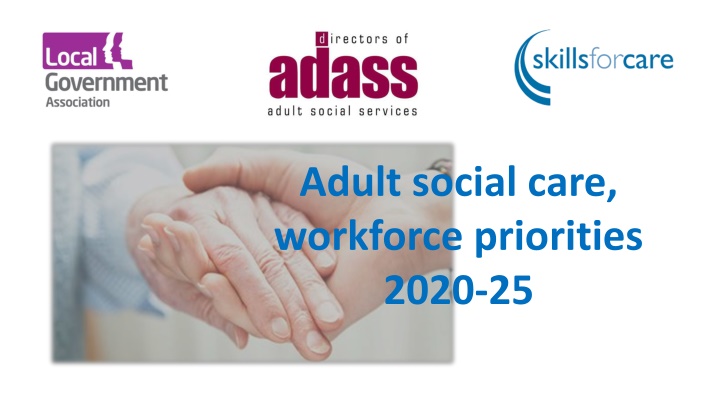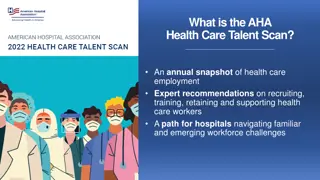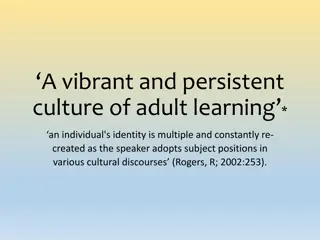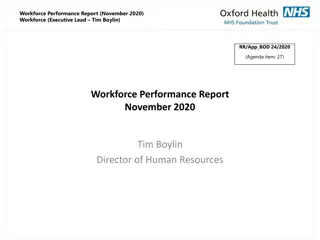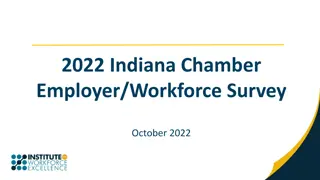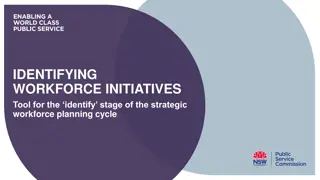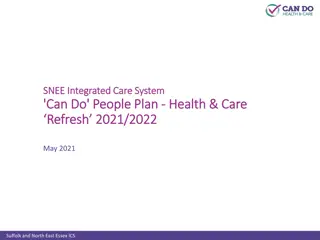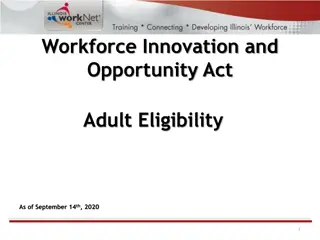Adult Social Care Workforce Priorities 2020-25 Overview
The adult social care workforce, consisting of over 1.5 million individuals, plays a crucial role in supporting people and families, fostering inclusive communities, and contributing significantly to the economy. The vision encompasses a compassionate society that enables independence, wellbeing, and community participation for all individuals with care needs. Key workforce priorities include strategic planning, skills development, technology utilization, mental health support, and promoting diversity and inclusion. These priorities are interconnected and aim to enhance the quality and effectiveness of care services.
Download Presentation

Please find below an Image/Link to download the presentation.
The content on the website is provided AS IS for your information and personal use only. It may not be sold, licensed, or shared on other websites without obtaining consent from the author.If you encounter any issues during the download, it is possible that the publisher has removed the file from their server.
You are allowed to download the files provided on this website for personal or commercial use, subject to the condition that they are used lawfully. All files are the property of their respective owners.
The content on the website is provided AS IS for your information and personal use only. It may not be sold, licensed, or shared on other websites without obtaining consent from the author.
E N D
Presentation Transcript
Adult social care, workforce priorities 2020-25
The adult social care workforce, comprising over 1.5 million people, undertakes vitally important work that supports individuals and families in our society and promotes strong and inclusive communities. Throughout these slides the term workforce includes: Employees working in statutory organisations with responsibility for ASC functions; Those commissioned by councils and employed by care providers or through agencies to deliver care and support; Those people employed via a direct payment i.e. personal assistants; Care staff employed as part of any integrated arrangements with Health; While not part of the paid workforce, we also recognise the invaluable role that informal and unpaid carers and volunteers play in supporting people to live the lives that they want to live in their own homes.
Our vision is of a compassionate and respectful society that enables independence, wellbeing and participation in community life for all. Our shared belief is that people with care and support needs should receive consistent, high quality help, support and safeguards that take account of their individual needs to ensure that they can live fulfilled lives in their own homes and communities. The social care workforce is the foundation in achieving this vision. The thousands of paid and unpaid carers, volunteers, social workers, occupational therapists, nurses and many others working in different organisations make it possible for people to live happy and healthy lives and help to create strong and inclusive communities. In addition, Social Care is a major employer, contributing 40.5 billion annually to the national economy, making it a key driving force for reform and transformation.
People who need care and support deserve a workforce that Puts individuals and families at front and centre, co-producing services that are personalised for them Has enough people with the right skills and values to provide high quality care and support. Is able to meet the demands of the future, when needs may be more complex. Offers good and fulfilling jobs, with clear career pathways and opportunities for personal and professional development. Is diverse, reflecting the communities in which we work and the people who we support. Is more integrated, with fewer obstacles for people to address. Adopts innovative approaches to person-centred care, including the use of technology. Is understood and valued by government and communities and that is reflected in national policy, communications, rewards and opportunities.
Shared workforce priorities In June 2020 ADASS, Skills for Care and the LGA agreed to work collaboratively on five shared workforce priorities areas. These are: 1. Strategic workforce planning 2. Growing and developing the workforce to meet future demand 3. Enhancing the use of technology 4. Supporting wellbeing and positive mental health 5. Building and enhancing social justice, equality, diversity and inclusion in the workforce. These priorities do not stand alone from each other but are inter-related. Each will be informed by market intelligence and any outputs will be co-produced with those people who use care and support services.
Shared Workforce Priorities Shared Workforce Priorities Strategic workforce planning Enhancing the use of technology Growing and developing the workforce to meet future demand Building and enhancing social justice in the workforce Enhancing the wellbeing of the workforce Workforce priorities Understanding workforce motivations Sustainable pay and rewards Valued resources and support Digital skills review Impact of COVID 19 Principles underpinning a workforce strategy Safe and rapid recruitment Developing digital leaders Safeguarding / addressing inequalities Evaluating the impact of support A more diverse workforce Market intelligence and data Rewarding career pathways Promoting innovative digital solutions Sharing learning Support offer
Strategic workforce planning Central to our vision for social care is the need to anticipate and respond effectively to the changing needs of the population over time. For too long, there has been no national strategic workforce plan for adult social care, despite the sector employing over 1.5million people, which is larger than the NHS workforce. We need a strategic workforce plan that local areas can use and adapt to their local circumstances and place. It will reflect social care reform and sets out a direction of travel for the sector, recognising that adult social care can be a key enabler to support the country out of recession by offering quality jobs with good opportunities. The plan will be system based, covering Health and Care. It will reflect the changing environment in which we live, supporting places to develop new, transformative models of care and support. It will be underpinned by credible data and intelligence that is used to drive strategies nationally and locally and will be informed by those with experience of using services.
Strategic workforce planning: our aim Our ambition is that all councils will have a strategic workforce plan, developed collaboratively with providers and partner organisations, that sets out the local vision, shared priorities and strategies for achieving them. We will deliver this through: i. Greater understanding of the motivations of the current social care workforce and the potential workforce of the future, through a national workforce survey; ii. Setting out the principles underpinning a national/regional workforce strategy that supports places in developing new transformative models of care, maximising the contribution that social care makes to national and local economies; iii. Ensuring that councils and partners have access to a national minimum data set to inform strategic workforce planning and reform.
Strategic workforce planning: practice and learning examples Our support offer will build on the work undertaken by the sector, including: LGA Workforce Focus and KHub provides support for senior HR professionals and their teams to develop local action plans for workforce improvement; SW Strategic Workforce Survey and plan that has strong links to Health and good engagement of providers. The governance structure sits alongside that of the People Plan for Health; North West regional strategic workforce planning framework developed in conjunction with users by experience, carers, providers, STP s, ICSs, LEPs and others and setting out how to create an environment in which excellent, high-quality integrated care can flourish; Wakefield workforce transformation strategy provides a road map for transformation to enable Wakefield partners and commissioners to achieve their vision for person centred co-ordinated care; Skills for Care ASC Workforce Data Set, workforce commissioning and planning resources, workforce outcome measure model, capacity planning tools and workforce productivity model. Support to commissioners and providers with workforce development; Integrated Care Systems People Plans.
Growing and developing the workforce If care and support continue to be delivered in the same way, workforce projections suggest that there would need to be a 32% (520,000) increase in social care jobs to 2.17 million by 2035. In the current climate of high turnover and vacancies this is unrealistic unless we see significant change, maintaining the status quo is undesirable. This is our opportunity to reset the system, to deliver care and support in a different way by a more agile workforce with blended roles to provide care that is personalized to individuals and families. Covid 19 raised public awareness of adult social care and national and regional recruitment campaigns achieved success in recruiting people into the sector. We now have an opportunity to build upon this, retaining those people who have moved into the sector and recruiting new people who have never considered social care before. But to achieve this we must improve the conditions and opportunities for the workforce to create rewarding and valued roles. In addition, we must improve the support to the wealth of unpaid carers and volunteers who provide invaluable support to the health and care system.
Growing and developing the workforce: our aim Our ambition is to work with councils, providers, government and partners to grow and develop a valued social care workforce that meets the needs of our communities. We will deliver this through: i. Working with government to agree a sustainable approach to pay and rewards in social care that brings parity with other public sector roles; ii. Supporting safe and rapid values-based recruitment and retention practices to attract and retain the right people in a rewarding and valued career; iii. Upskilling care staff to undertake rewarding roles and supporting the development of career pathways linked to appropriate pay levels that raise the profile and status of the workforce, ensuring that people see social care as a long-term career opportunity.
Growing and developing the workforce: practice and learning examples Our support offer will build on the work undertaken by the sector, including: National recruitment campaign Care for others. Make a difference aimed at attracting people to social care. The campaign highlights the vital role of the social care workforce during the pandemic, along with the longer-term opportunity of working in care. Online good practice resource of local recruitment initiatives being developed by ADASS, SfC, LGA and the National Care Forum; Supporting employers to recruit for potential from under-represented groups and providing SfC resources to help them to achieve this; Upskilling of social care staff with appropriate pay structures,to build system resilience and develop more sustainable health and social care systems to meet local needs. The project is led by NHSEI and SfC; SfC workforce data modelling to understand the needs of the sector in the future.
Enhancing the use of technology Technology cannot replace what we value most about our workforce. However, the development of new digital solutions and the adoption of technology at scale can help to mitigate the risk of reliance on unsustainable long term care and support models which rely upon an increase in unrealistic projected workforce numbers. Technology provides opportunities to improve outcomes for individuals and families, enabling greater independence by allowing people to be more connected to those around them. We must innovate, as we have during Covid 19, to better understand how we use technology, and connectivity with other professions, individuals and families, to provide personalised care and support. We see technology and better working practices as a key enabler to developing a more modern and agile workforce, meeting care and support needs in more efficient and effective way.
Enhancing the use of technology: our aim Our ambition is to optimise the opportunities offered by digital technology to address workforce challenges and support new, more integrated and flexible ways of working. This will be delivered through: i. Undertaking a digital skills review with NHSX and partners to inform strategies to develop a digital ready workforce, including the culture change required; ii. Working with employers as digital innovators to support the development of minimum digital capabilities for everyone working in health and care, building on Digital Discoveries to strengthen digital leadership and skills in the workforce; iii. Bring together councils and the private sector to co-produce innovative digital solutions to common adult social care challenges in order to innovate at scale;
Enhancing the use of technology: practice and learning examples Our support offer will build on the work undertaken in councils, with providers and partners to enhance the use of technology, including learning from the Digital Discoveries undertaken by NHSX, DHSC and SfC and solutions developed through the Social Care Digital Innovation Programme, including: Cambridgeshire CC are enhancing the independence of those with learning disabilities in the community during their transition to adult social care; Essex CC are exploring real-time prediction and/or monitoring of falls testing technology used in other fields; North Somerset Council are using technology to identify and proactively manage hydration in care homes;
Wellbeing of the workforce During Covid-19, we recognise the significant cost that has been borne by many across the workforce, protecting those in society with care and support needs. The impact of the pandemic on staff wellbeing should not be underestimated. However, efforts to support wellbeing should not just be seen as a short-term response to Covid-19, but a sustained commitment to tackle long-term drivers of poor staff experience, health and wellbeing. The delivery of this vision relies on the development of a productive workforce which has a readiness for change - from unpaid carers to system leaders. People managers are central to making this a reality.
Wellbeing of the workforce: our aim Our ambition is to ensure social care employers and managers have the tools to support and enhance the mental health and wellbeing of their staff both now and in the future. Our priority will be delivered through: i. Ensuring that there is appropriate advice, support, resources and tools to support all parts of the workforce, filling any gaps in the current support and helping people to navigate the range of resources available to them; ii. Evaluating the impact of resources available to support wellbeing in order to inform strategies to evolve the offer as needs change over time; iii. Sharing examples of where employers drive culture change to develop a resilient workforce that achieves recognition and status.
Wellbeing of the workforce: practice and learning examples Our support offer will build on the work undertaken in councils, including: NW ADASS worked with carers, health, the third sector, academics and councils to help people to provide tailored support for different groups of the workforce, helping them to navigate the resources available: www.nwadass.org.uk/workforce-mental-health- wellbeing. The SE regional resources were developed with the LGA, NHSE & NHSI, to provide advice, tools and on-line support for dealing with stress and anxiety arising during COVID 19: www.local.gov.uk/our-support/workforce-and-hr-support/wellbeing. LGA support to protect the mental health of front line staff and key workers during COVID-19 www.local.gov.uk/our-support/workforce-and-hr- support/wellbeing/wellbeing-front-line-staff
Build and enhance social justice, equality, diversity and inclusion in the workforce Social justice, equality, diversity and inclusion is at the heart of social care and any future workforce strategy, addressing inequalities in the system that adversely impact upon specific groups in the workforce, including people with disabilities, women and people from BAME communities and shaping the future of social care. The entire social care workforce must strive for equality of outcomes, focusing on freedom, independence, safeguarding, prevention and on good advice, so that we support good lives, and give dignity and respect.
Build and enhance social justice, equality, diversity and inclusion in the workforce: Our aim Our ambition is to create a diverse and inclusive workforce which better reflects our communities and where all those working in care have equality of opportunity, dignity and respect. This will be delivered through: i. Working with other national organisations to better understand the impact of COVID 19 on BAME people and others groups in the workforce, in order to support those people to be safe; ii. Addressing inequalities and safeguarding those in the workforce who are vulnerable by raising awareness and developing skills and practices that mitigate risk; iii. Continuing to increase the diversity and inclusiveness of the workforce, creating career opportunities that appeal to all parts of the community.
Build and enhance social justice, equality, diversity and inclusion in the workforce: practice and learning examples Our support offer will build on the work undertaken in councils, including: BAME and workforce good practice: Many councils have been carrying out risk assessments and working with their BAME employees to find out what how best to manage the safety of these staff at work. Examples are on the LGA's COVID-19: good council practice webpage. Workforce Race Equality Standard: ADASS, LGA and SfC are working with the Chief Social Worker to support the health and care system to improve workforce race equality and to address any inequality in the system. ADASS Equality, Diversity and Inclusion Action Group: with membership across the ADASS organisation with a remit to address equality, diversity and inclusion from the perspective of ADASS as an employer, ADASS as a membership organisation and ADASS members as leaders back in their own organisation.
